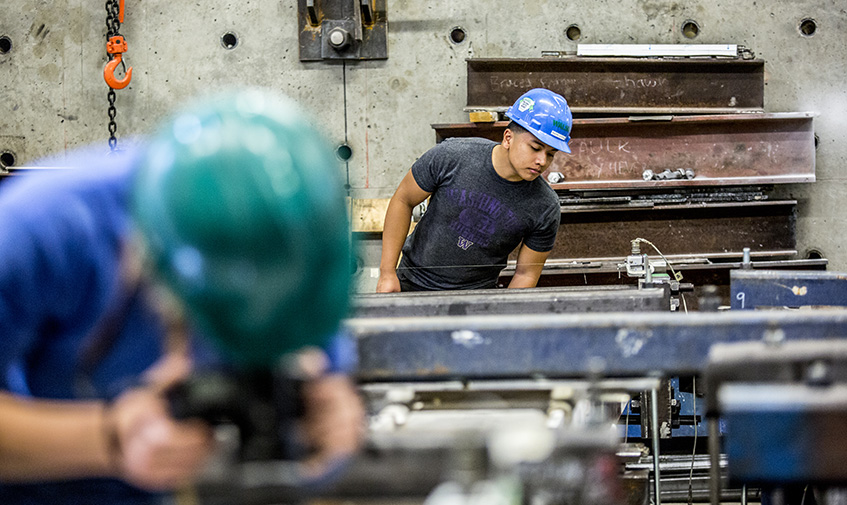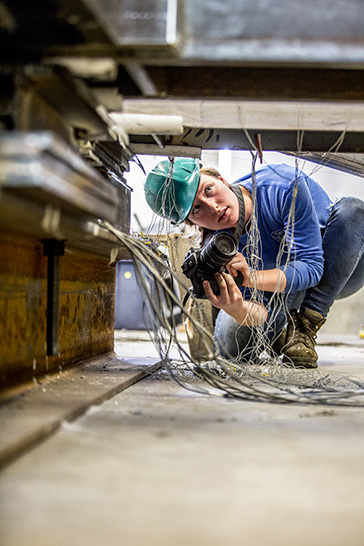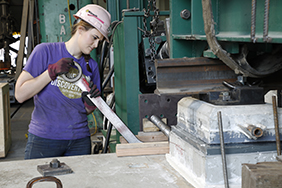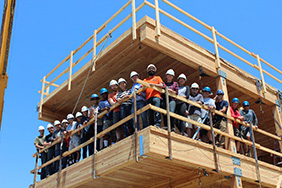
A full-scale test on a steel braced frame in the Large-Scale Structural Engineering Testing Laboratory evaluates the seismic performance of chevron braced frames with beams that that are weaker than current code requirements.
Overview
UW CEE structural engineers perform innovative research across a wide range of topics using experimental, numerical and analytical techniques. The diverse expertise of the structural engineering research group provides unique opportunities for research. Current research projects are aimed at improving the resiliency of structures against earthquake, tsunami and wind hazards; creating more durable materials; modeling, evaluation and design of reinforced concrete, prestressed concrete, steel, timber and composite structures; improving the sustainability of structures and designs for rapidly constructed structures; enhanced structural systems for marine and aerospace environments; and developing computational mechanics tools for numerical modeling of complex physical phenomena, including the structural behavior of turbine blades as they interact with the surrounding fluid media. Faculty are closely engaged with the professional engineering community and their research is consequently implemented in practice.
The structural research laboratories provide capabilities for multi-scale experimental studies of component or system response to complex loading scenarios. Advanced computing capabilities enable the development of state-of-the-art models of seismic structural response, large-scale fluid-structure and soil-structure interactions, and complex computational mechanics, among other topics.
Research topics

- Reinforced and prestressed concrete structures
Faculty involved: Paolo Calvi, Marc Eberhard, Dawn Lehman, Laura Lowes, Travis Thonstad - Concrete engineering using advanced or recycled materials including use of 3D printing
Faculty involved: Paolo Calvi, Dawn Lehman, John Stanton, Travis Thornstad - Steel and composite structures
Faculty involved: Jeff Berman, Dawn Lehman, Charles Roeder - Earthquake engineering
Faculty involved: Jeff Berman, Paolo Calvi, Marc Eberhard, Dawn Lehman, Laura Lowes, Charles Roeder, John Stanton, Travis Thonstad - Tsunami engineering
Faculty involved: Marc Eberhard, Dawn Lehman, Michael Motley - Accelerated bridge construction
Faculty involved: Paolo Calvi, Marc Eberhard, Dawn Lehman, Charles Roeder, John Stanton, Travis Thonstad - Advanced numerical simulation and computational mechanics
Faculty involved: Laura Lowes, Peter Mackenzie-Helnwein, Gregory Miller, Michael Motley, Richard Wiebe - Aerospace structures
Faculty involved: Richard Wiebe
Student research
Researchers: Master’s student Kristina Tsvetanova, alumni Travis Thonstad and Matthew Sisley

Light rail will cross a floating bridge for the first time in the world when construction is completed on Sound Transit’s East Link Extension Project in 2023. The engineering feat is possible thanks to a team of researchers, including master’s student Kristina Tsvetanova (shown here), and former students Travis Thonstad and Matthew Sisley, who are collaborating with consultants to test various features of the system, which has never before been implemented. Since not a single hole is allowed on the bridge deck, engineers developed a solution to connect light rail tracks to the bridge without the use of traditional methods such as bolts. Tsvetanova is leading the team conducting tests on the final prototype, which consists of a complex “sandwich” of different materials to connect the rails to the bridge deck.
Researchers: Sarah Wichman, master’s student

Building high-rises that are both earthquake resilient and sustainable is the goal of a team of researchers from across the country, including master’s student Sarah Wichman. The researchers paired a new type of sustainable building material with a rocking wall system, which allows walls to rock back and forth during an earthquake. The rocking wall concept, now quite widely copied throughout the industry, was originally developed at the UW in the 1990s. During a large-scale test of the system, Wichman oversaw the installation and testing of the rocking walls. The researchers found no significant damage to a two-story prototype after 14 earthquake simulations. The research may one day inform the next generation of buildings constructed in earthquake zones.
Excellence in teaching
The Structural Engineering faculty members hold teaching to be an important part of their work, and have a long record of excellence in teaching. Two faculty hold University Distinguished Teaching Awards, another has won the Departmental Teaching Award more frequently than anyone else, and two more have recently achieved “perfect” teaching ratings from their classes.
Laboratories
The following laboratories feature equipment that structural engineers utilize to conduct research:
- Large-scale Structural Research Laboratory
- Structural Creep Laboratory
- Structural Vibrations Laboratory
- X-ray Computed Tomography Laboratory
- Construction Materials Laboratory
Centers
Centers headquarter research on specific themes and act as hubs connecting faculty and students with resources to support research, education and outreach activities. Researchers are affiliated with the following centers:
- NHERI RAPID Post-Disaster Rapid Response Research Facility (led by UW CEE)
- Pacific Northwest Transportation Consortium (led by UW CEE)
- FHWA Accelerated Bridge Construction Center (led by Florida International University)
Degree programs
- Structural Engineering & Mechanics Master’s Program
- Structural Engineering & Mechanics Ph.D. Program